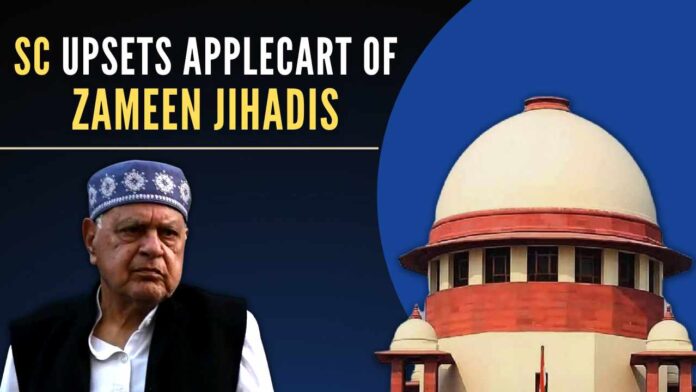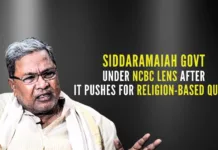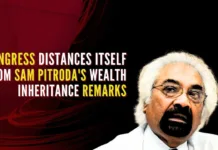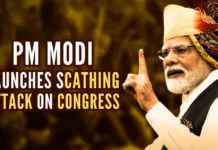
SC refuses to stay J&K Govt’s anti-encroachment drive
An ardent believer in the concept of limited accession with India and co-founder of JKLF, Farooq Abdullah, as J&K CM, along with other radical Islamists, virtually caused a total exodus of Kashmiri Hindus, Jammu Dogras and Punjabis on January 19, 1990. The custodians of the Indian state watched the deplorable developments, including the orgy of death and destruction, as a mute spectators. Rather, they allowed radical Islamists to do what they wanted to do to further disturb the already rather disturbed and delicate socio-religious and political equilibrium in Kashmir. After making Kashmir hundred percent Hindu-free, Farooq Abdullah fled away to London to escape the terrorists’ wrath. He was mortally afraid of terrorists because supported-to-the-hilt by the then PM Rajiv Gandhi, Farooq Abdullah had rigged wholesale the 1987 Assembly elections to recapture the state power. The murderer of democracy and fanatic Farooq Abdullah returned to India in 1996 on the eve of the Assembly elections obviously after the Congress-led Union government reassured him that he would be installed as J&K CM. On October 9, 1996, he took over as J&K CM for the third time.
Demographic invasion: Brief History
Earlier in 1994, Farooq Abdullah, along with BJP bigwig Atal Bihari Vajpayee, had participated in the UN Human Rights Council proceedings in Geneva, where Pakistan suffered a humiliating defeat on the issue of the human rights situation in the terrorist-infested Kashmir. Pakistan had to withdraw its nasty resolution on J&K after the European Union members and others exposed the Pakistani ulterior game plan and explained the social composition of the ongoing separatist movement in Kashmir. The upshot of their whole argument was that it was an all-Sunni movement and that the Dogras, the Buddhists, the Gujjars and Bakerwals, and the Shitte Muslims had nothing to do with the separatist movement and that the movement was basically confined to Kashmir. The Geneva defeat convinced the Pakistani political leadership and spy agency, Inter-service Intelligence (ISI), and its agents in Kashmir that if they were to “accomplish the unaccomplished agenda of partition” or separate J&K from India, they had no other option but to create a Kashmir-like situation in Jammu province, especially in the strategic Hindu-majority district in Jammu.
The installation of Farooq Abdullah as J&K CM turned out to be a god-sent opportunity for the break-India forces within and outside to try to replicate Kashmir in Jammu. Significantly, it was none other than Farooq Abdullah, who vouches for Indo-Pak dialogue on a daily basis for the so-called resolution of the “Kashmir problem”, himself grabbed seven kanal seven marlas of state/ forest land in Jammu’s Bathindi (near the vital army installation at Sunjuwan) and constructed a palatial house on the encroached land. The Bathindi encroachment was bound to encourage others to loot and plunder the state and forest land in Jammu and elsewhere, including Sidhra, Chowadhi, along the national highway and the border belt from Jammu’s Kathua district to the Rajouri district’s Sunderbani tehsil. As a result, many colonies came into being in and around Jammu city with the government and the concerned departments watching these disturbing developments as mute spectators or themselves facilitating the loot and plunder of the state/ forest/ Kahcharai (grazing) lands with a view to changing the Jammu’s demographic landscape.
According to the J&K Revenue and Forest Departments, former ministers and their relatives, including former J&K CM Ghulam Nabi Azad’s two brothers, former legislators, judges’ sons, bureaucrats, and who not occupied these lands to construct residential houses, set up business establishments and showrooms, open educational institutions and build banquet halls. And the encroachers belonged to all the parties, including the NC, the PDP, the Congress, and the BJP, and a very vast majority belonged to one particular religious community. The bulk of them were from Kashmir and mountainous areas of Jammu province, especially the erstwhile Doda district and Poonch and Rajouri districts.
Legislative sanctity to illegal action
In between, the encroachers of the state land in the government, including Farooq Abdullah, and those who succeeded him such as Mufti Sayeed and Ghulam Nabi Azad, accorded illegal legislative and executive sanctity to the illegal actions so that the looted and plundered lands remained the preserve of the encroachers. Farooq Abdullah made the legislature pass the J&K State Land (Vesting of Ownership to the Occupants) Act, 2001 known as the “Roshni Act”. Mufti Sayeed, who succeeded Farooq Abdullah in 2002, framed rules under the Roshni Act to further benefit the encroachers. And Azad went several steps further between November 2005 and July 2008 to change the demography of Jammu province on a massive scale through the “rules” that he framed under the obnoxious Roshni Act. During his period, “thousands of acres of land was transferred to illegal occupants at nominal prices for regularization” and ‘the beneficiaries included top ministers, politicians, police officers, bureaucrats, and others”.
The doors of J&K HC knocked
In 2011, Prof S K Bhalla, Principal of Government Degree College, Mendhar, approached J&K HC pointing out allegations of land grabbing, prayed for a probe into the allegations by a “special Investigation Team” and sought “appropriate criminal and disciplinary action against the guilt”. Later in 2014, advocate Ankur Sharma, then a law student at Pune and presently president of Ikkjutt Jammu Party, filed an intervention application in the petition “seeking CBI probe into the scam”. In fact, he challenged the constitutional validity of the Roshni Act and prayed that the “illegal encroachments legalized under the Act be retrieved”. He had alleged that “twenty lakh forty-six thousand four hundred and thirty-six (20,46,436) kanals of land was under the illegal occupation of land mafia”. To make his point, he relied on the 2013 report of the Comptroller and Auditor General (C&AG) on the subject and the revelations made by the Principal Accountant General (Audit) J&K, SC Pandey, on March 8, 2014, during the press conference held in Jammu.
Terming the Roshni land scam as the “biggest-ever land scam,” Pandey, inter-alia, had said that the fraud caused a loss to the state exchequer to the tune of “Rs.25,000 crore”. He had taken on senior government functionaries, including those heading administrative departments in the civil secretariat for their “indifferent, non-cooperative and hostile treatment to the audit parties while conducting the test check of Roshni cases in six districts of the state”.
Judgment
It was on October 9, 2020, that the division bench of the J&K HC consisting of then Chief Justice Gita Mittal and Justice Rajesh Bindal pronounced its judgment. It declared the rules made under the Act illegal and unconstitutional. It, inter-alia, read like this: “It is trite that Rules cannot be beyond statutory provisions. The J&K State Lands (Vesting of Ownership to the Occupants) Rules, 2007, are clearly ultra vires the parent Act…” As for the validity of the Act itself, the bench held that the “respondents through the Act encouraged encroachment of State and forest lands and that the object of the enactment was completely illegal and unacceptable”. “The enactment has been worked to facilitate illegal vesting of state lands in the hands of power despite the mandate of the land…Government officials had the gumption and absolute arrogance to publish rules which did not have the clearance of the legislature speaks volumes about the influence of the beneficiaries…The Roshni Act is unconstitutional for violation of Articles 14 and 21 of the Constitution…The large tracts of state lands illegally vested with encroachers under the Roshni Act, 2001 must be retrieved in accordance with the law,” the judgment also read.
Government acts, encroachers react violently
After much dilly-dallying, the J&K government finally planned to act. On January 11, the government issued directions to all the twenty Deputy Commissioners to “ensure 100% removal of encroachments from State land, including Roshni and Kahcharai, by the end of the current month and submit compliance report”. As was expected, all the Kashmiri parties, including the Abdullahs’ NC, Sonia’s Congress, Ghulam Nabi Azad’s Democratic Azad Party (DAP), Mehbooba Mufti’s PDP, Sajad Lone’s People Conference, M Y Tarigami’s CPIM and Altaf Bukhari’s JK Apni Party upped the ante and condemned in downright language the official move on the encroachments. Significantly, Arvind Kejriwal’s Aam Admi Party and former minister Lal Singh’s Dogra Swabhiman Sangathan Party (DSSP) also made common cause with the Kashmiri parties and urged the J&K government to withdraw its land-retrieval order. Some of these outfits also held protest demonstrations in Kashmir and Jammu, approached the Supreme Court, and filed petitions seeking to stay on the government order.
What did encroachers and critics of the government order on the encroached lands say? Omar Abdullah said: “They (BJP) want to ‘harass’ the people. Instead of applying balm to the wounds of people, they seem to have a penchant to aggravate the hurt…The order directing removal of encroachments by January 31 is draconian”. Mehbooba Mufti said: “Basically, laws are framed for the welfare of people but here laws are being weaponized to disempower, humiliate and punish the people…But this time they have gone too far.” Azad has said: “Retrieving land from poor and landless people is unfortunate…Those who in my government were provided land to build houses or cultivate to sustain their livelihood are rendered houseless or landless in the present dispensation. This practice should end.” The Sonia Congress has termed the order as “arbitrary and unjustified”. Lone has said that the move was “against the basic principle of eradicating homelessness”. Targami has denounced the official move as an “administration-sponsored land grab” and an attempt to “pauperize people by snatching their land and creating private land banks”. The AAP has accused the J&K government of “harassing the poor and marginalized sections of society on the pretext of removal of encroachments and retrieval of state and forest lands from them”. At the same time, however, it also dared the government to “retrieve the forest land from the ex-ministers, MLAs, MLCs and other bureaucrats in areas like Bhatindi, Sunjuwan, Chowadhi, Nagrota, Bajalta, etc in the vicinity of Jammu city”. Lal Singh has, among other things, said: “The ruling government is working against the common man. The farmers cultivating their land for years are dislocated from their land. Firstly it was till March now the government gave a deadline ending January to vacate state land under the possession of people. He said 32 percent of land in Jammu and 68 percent is under possession in Kashmir. This is the better time to unite both Hindus and Muslims to fight for their rights”.
SC ruling
On Friday (January 20), the Supreme Court refused to stay a circular issued by the J&K government directing Deputy Commissioners to remove encroachments. A bench of Justices M R Shah and C T Ravikumar ruled: “We will not grant a general stay…” No wonder then that the SC ruling has upset the applecart of Zameen Jihadis. It’s hoped that the SC stay would arm the J&K government with the necessary legal power to demolish the houses built illegally on the encroached lands by Farooq Abdullah and others of his ilk in Jammu and elsewhere and defeat all those who have been trying their best since 1994 to create a Kashmir-like situation in Jammu province.
Note:
1. Text in Blue points to additional data on the topic.
2. The views expressed here are those of the author and do not necessarily represent or reflect the views of PGurus.
PGurus is now on Telegram. Click here to join our channel and stay updated with all the latest news and views
For all the latest updates, download PGurus App.
- ‘Kashmir My core constituency’: Revisiting July 12, 2003 to understand politics, Omar Abdullah-style - March 15, 2024
- Total deviation from traditional approach: Seven takeaways from PM Modi’s March 7 Srinagar visit - March 9, 2024
- Status of political parties: Why is further J&K reorganization imperative? - March 1, 2024











Thank god, SC didn’t put a stay order on the so called ‘humanitarian grounds’
Looks good till now……